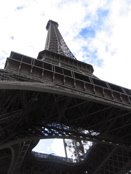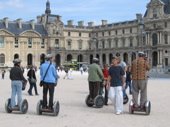Actually, the mood has been electric since mid-February, when François Bayrou crept up from behind to challenge to two main contenders for the Élysée (the Palais de l’Élysée is the presidential residence – basically the French White House) and turned the fairly predictable election into something much more interesting.

The way the French présidentielle works is by a run-off system. Each political party has the option to present a candidate who must gather 500 signatures from elected officials in at least 30 French departments (regions). The only other requirements to be a candidate are to be of French nationality and be at least 23 years old. After the official candidate list is announced, the candidates enter an official campaign period, the rules of which are strictly enforced – each candidate must be allotted the exact same amount of television time, whether through commercials, interviews or debates. The day before the elections campaigning is forbidden – no speeches, appearances or ads are allowed in order to give voters a “day of reflection.” Citizens vote on all candidates in the prémier tour of elections (which took place here on Sunday, April 22nd). If no candidate receives an absolute majority, there’s a run-off election between the top two two weeks later.
This year 12 offical candidates were announced, the favorites of which have long been Ségolène Royal from the Socialist Party and Nicolas Sarkozy of Jacques Chirac’s party the UMP. A run-off between Ségo and Sarko as they’re popularly called, has long been the expectation, but the emergence of the centrist candidate François Bayrou in the polls in February and March threw a serious wrench into the predictability of the election. As the first voting round drew closer, France was mainly concerned with four candidates – Ségo, Sarko, Bayrou and Jean-Marie Le Pen, a racist, fascist, holocaust-denying, extreme right-wing candidate with one eye, who shocked the country and the international scene when he made it into the second round of voting in the 2002 présidentielle. As extreme and offensive as Le Pen may be, he consistently manages to garner a hefty percentage of votes. Last Sunday he received around 11 percent of votes, compared to the inoffensive Green Party candidate’s 1.5 percent.
Polling stations opened at 8 am Sunday morning and officially closed at 6 pm. Unlike the U.S. elections, where voters watch the slow roll of blue or red across the country as polling stations close in each state and see the votes mounting up as they’re counted, the estimated results are not allowed to be announced until 8 pm the night of the first round. At 7:50 Sunday evening, Rachael, our friend Tom and I arrived at a friend’s parents’ Moroccan restaurant, which had opened early for the election results. Faris (the Moroccan friend) and a few other people had set up a projector and speakers so the news was playing 10 feet tall against the wall of the restaurant when we arrived.
The scene reminded me of New Year’s eve, with a countdown clock ticking away the seconds in the corner of the screen, and the camera views alternating between the different candidate’s headquarters. When the clock reached 7:59:30, a collective “SHHHH” rolled around the restaurant and everyone began counting down with the ticker, clutching wine or beer in one hand and frantically silencing cell phones with the other. At precisely 8:00:00, the screen was filled with two headshots – those of Ségo and Sarko before switching once more to the headquarters of each candidate. The whole scene was almost ridiculously theatrical – from the countdown to the winners’ pictures to the photo montages set to inspirational music that played homage to each candidate. I was reminded more of the Academy Awards or New Year’s with Dick Clark more than a serious political event – but I guess the French are used to doing it with flair.
The restaurant where we were was smack in the middle of the 11ème arrondissment, not too far from place de la Bastille – an area that is distinctly left-wing. When Ségo’s picture flashed on the screen the restaurant erupted in cheers – which shortly turned into boos and irritated Sarko insults when the percentages of votes tipped less and less in her favor. Over in the 2ème arrondissement, on the other hand, Sarko’s advance is being celebrated. As I find myself surrounded by some of the most politically aware kids I’ve ever met, I didn’t bat an eyelid when Paul (7) told me that he was “so happy” that Sarko made it, and was only mildly surprised when Ella (10) went off into a tirade about how “everyone wants Ségolène because they think she’ll give money to poor people, but really she’ll make everything more expensive for every one else with too many taxes!” Even 2-year old Georges knows, in direct accordance with the politics of his parents, that “Ségolène bad.”
While I’m sure 99 percent of what I hear from the kids is regurgitated straight back from their parents, it still amuses me to no end when Paul tells me he can’t wait for May 6th to find out who will win. Though Sarkozy came out of the first round with 31.18 percent and a clear lead over Royal’s 25.87 percent (numbers that three of my four nannying charges had memorized to the 100th), nobody knows where Bayrou’s 18 percent will go. At the moment, he’s endorsing neither candidate, and has instead declared that he’ll be founding a new political party – the Parti démocrate. The rest of the votes are easy to assign – Le Pen’s extremist votes will most likely go to the immigration-unfriendly Sarkozy, while most of the little leftist parties will be casting their votes for Ségolène. It’s the middle 18 percent that has everybody aflutter – and while my personal prediction is Sarkozy in the Élysée, we won’t know for sure until next weekend.
Meanwhile, Paul and I are counting down the days.















1 comment:
The San Francisco paper had an editorial about the French election - the gist was that Sarko would be a better friend to the US and would overlook the anomaly of the last 6 years.
Post a Comment